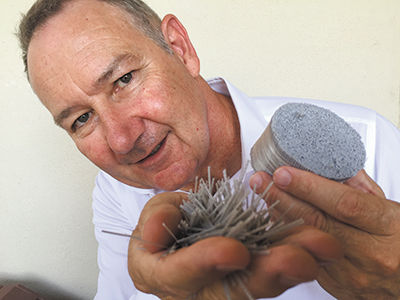A revolutionary method for replacing steel mesh used in concrete reinforcement with recycled plastic has seen Queensland engineering firm Fibercon recycle over 50 tonnes of plastic waste.
Developed in conjunction with researchers from Queensland’s James Cook University the technology uses recycled polypropylene plastic for reinforcing concrete instead of the traditional steel, resulting in reduced carbon dioxide emissions, water usage and fossil fuels.
Fibercon Chief Executive Officer, Mark Combe, explained, “Plastic fibres in concrete have been around for twenty years – what is new about our product is that it is 100 percent recycled. The intention is to do something to give back, to close the cycle of useless waste.”
Since its first use in 2017 the technology incorporated into Fibercon’s Emesh product has been used by councils predominantly in footpaths, but also has applications from pavement concrete to channel drains, embankment erosion control, precast sewer and stormwater pits.
According to a report prepared for the Department of Environment and Energy in 2016, Australia averages 107kg of plastic waste per person each year.
“So we have effectively recycled the plastic waste for 467 Australians,” Combe said.
Steel reinforcement in concrete – or rebar – was first introduced in the mid 18th century as a means of improving the tensile strength of concrete, and is now the most commonly used form of concrete.
With concrete use at approximately one cubic metre per person, Australia uses 25 million cubic metres of concrete per year. Conservatively, five percent is footpath and light pavements – equating to 1.25 million cubic metres.
“If we replaced all the steel mesh in these pavements with Emesh, we would reduce our carbon dioxide by 125,000 tonnes annually, and re-use 5000 tonnes of waste plastic. It’s an exciting goal for us.”
Worldwide around 1.6 billion tons of steel is produced per year making steelmaking one of the world’s leading industrial sources of greenhouse gases. It is also heavily dependent on the use of fossil fuels and water.
Production of a ton of steel generates almost two tons of carbon dioxide emissions, accounting for as much as five percent of the world’s total greenhouse-gas emissions.
By using the recycled plastic technology Fibercon has seen a reduction to date of 1000 tonnes of carbon dioxide, 200 tonnes of fossil fuels reduction, and 18,000 cubic metres of water usage reduction, the equivalent of taking 214 passenger cars off the road for 1 year (US-EPA).
With increasing recognition by local, state and federal governments of the need for sustainable building practices, Emesh is seen as a solution which contributes to the ever-growing quest for carbon neutrality and reduced environmental impacts.
*Copy supplied by Fibercon

















